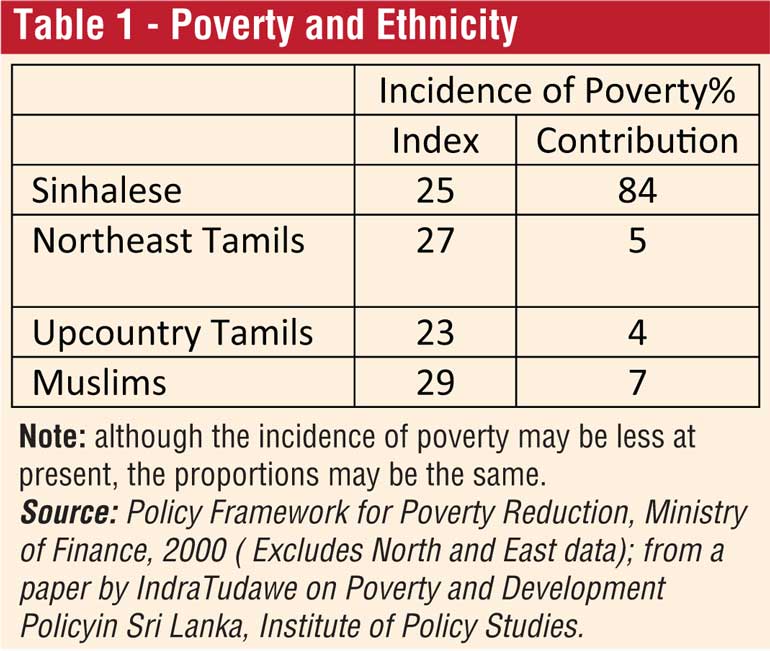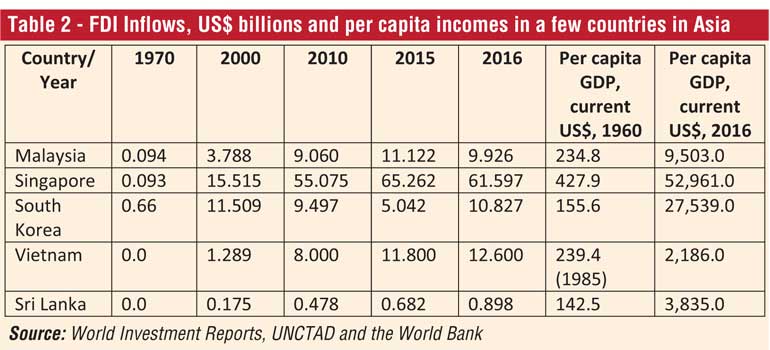Monday Feb 23, 2026
Monday Feb 23, 2026
Wednesday, 8 November 2017 00:00 - - {{hitsCtrl.values.hits}}

 There are various types of opponents of the proposed constitution. Some oppose for political reasons. Others oppose because they have ‘competing commitments’ as pointed out by organisational psychologists. Among the latter are the venerable Buddhist monks.
There are various types of opponents of the proposed constitution. Some oppose for political reasons. Others oppose because they have ‘competing commitments’ as pointed out by organisational psychologists. Among the latter are the venerable Buddhist monks.
Both groups may be ignorant of the fact that a new constitution giving equal rights to all communities and devolving power to the provinces is of utmost importance to solve the main problem facing the nation, i.e. the high levels of poverty and inequality of incomes.
The latest poverty report (2015) by the World Bank reveals that in 2012/13, those earning less than $ 1.25 per day (the destitute) numbered 3.3% of the population, while those earning less than $ 2.50 per day were 32.1% of the population. It has to be noted that poverty is high mostly among the members of the majority community; see table 1.
The major reason poverty has not been alleviated is due to the fact that investments, especially Foreign Direct Investments (FDI), have not been attracted to the country to set up manufacturing industries to create jobs and produce goods and services for export to earn the necessary foreign exchange; see table 2. FDI is required because of the scarcity of local capital, technologies and the absence of ready access to global markets on the part of domestic businesses.
FDI has avoided the country due to the country risk involved. This could be due to certain actions of political parties (that gained power after 1956) which have tended to discriminate against people belonging to the minority communities numbering about 25% of the population. Tamils claim that they have been discriminated against in areas such as employment in the public sector, higher education and in the courts of law due mainly to the replacement of English with Sinhala as the official language in 1956.
Another complaint is that the authorities have been slow to act against extremist groups who have unleashed violence against minority communities even recently. It is such tensions that have been created along with the poor regulatory and law and order conditions well as corruption that increase the risk of investment and lower the profitability of business operations even by locals.
According to the Organization for Economic Co-operation and Development (OECD) Country Risk Classification 2017 rank, the level of country risk in respect of Sri Lanka is 6, Malaysia 2, Singapore 0, India 3, Afghanistan 7; however, according to the Worldwide Governance indicators 2016, World Bank, political stability and absence of violence/terrorism %, Sri Lanka’s rank was 49.52, while that of Singapore was 99.52, Malaysia 50.0, India 14.29 and Afghanistan 0.95. It may be noted that the World Bank ranking is much more realistic than the other by the OECD. Nevertheless there appears to be a fairly high risk faced by investors venturing into Sri Lanka.
A new constitution modelled on the South African Constitution of 1996, which is one of the most progressive in the  world according to Rohan Edirisinghe, could be the main remedy to the above situation of high country risk for investment and the negative enabling environment for economic development.
world according to Rohan Edirisinghe, could be the main remedy to the above situation of high country risk for investment and the negative enabling environment for economic development.
However, one must first answer the question why Sri Lanka needs a new constitution. It is mostly by modelling the 1972 and 1978 constitutions to favour them and not the people that politicians have made short term political gains, resorted to amass wealth at the expense of the taxpayer, created communal tensions leading to a destructive 30-year war and created a highly indebted economy that is unable to promote the wellbeing of the people.
Sri Lanka therefore needs to formulate a new constitution with the following features:
1.The constitution must be supreme. Article 2 of the South African Constitution of 1996, according to Rohan Edirisinghe, states ‘The Constitution is Supreme. All law inconsistent with it is void’, unlike in the case of the Sri Lankan constitution of 1978.
2.As in the South African constitution, it should contain a Bill of Rights that is compatible with international agreements on human rights to protect the rights of all people belonging to both the majority and majority communities, so that the elected representatives cannot interfere with them.
3.It must emphasise on the values and principles under which people will be governed. Edirisinghe says that Article 1 of the South African constitution contains the values such as ‘human dignity, non-racialism, the rule of law, multiparty democracy, accountability, openness and responsiveness’.
4.It should deal clearly with separation of powers among the legislature, the executive and the judiciary to protect public institutions from politicisation and to ensure the Independence especially of the judiciary, other legal institutions as well as the Public Service (to enable the improvement of its efficiency by making appointments and giving promotions on merit alone and resulting in deregulation), the Attorney General’s Office, the Auditor General’s Office and a new Office dealing with Control of Corruption answering only to parliament.
5.The new constitution should allow the Provincial Councils to operate without interference from the Centre; (the amalgamation of the Northern and Eastern Provinces, however, does not seem to be necessary for reconciliation as people of all communities live in that area).
6.The electoral system in the new constitution should be the First Past the Post system to elect representatives from constituencies and not districts combined with Proportional Representation; candidates should possess some minimum qualifications like the GCE (AL) as legislation and policy formulation for the wellbeing of the people need some education. The number of representatives elected should be reduced considerably to reduce expenditure and improve efficiency.
7.The three languages i.e. Sinhala, Tamil and English should be declared as the official languages of the country.
8.The constitution has to give an assurance that Buddhism and other religions observed by the people will be protected and preserved; in other words the state will be neutral/secular in matters of religion, while supporting them, the significance of which was explained by Neera Chandhoke, Professor of Political Science, University of Delhi in an article dated 2015: ‘It compels people to respect other religious beliefs. Secularism is a part of democracy which grants to citizens equal rights. It protects democracy by limiting the power of the majority. Secularism protects the equal rights of the minorities. Secularism is therefore desirable for a plural society like India.’
Such a new constitution may help to overcome the prevailing social and political instability in the country and help to improve the wellbeing of the people and alleviate poverty especially by attracting investment to create jobs and produce goods and services for global markets. Those opposing the setting up of such a new constitution therefore may be obstructing the alleviation of poverty (especially in the majority community).
Although they say that equal rights and devolution may lead to separation, they should realise that actually it may happen if such a conciliatory approach is not adopted, as it nearly took place when LTTE went to war due to discrimination. The venerable bhikkus and the rest of the clergy could, however, concentrate their efforts to establish ethical values and good conduct to deal with spiralling crime which also threaten investments.
Actually resistance to a new constitution could be due to the failure on the part of the leaders of the country to create a consensus among the people regarding measures such as investment for improving the general wellbeing; in the absence of such a consensus people would not know what laws and policies are needed, for instance, to alleviate poverty and reduce inequality of incomes. Therefore the clergy, the teachers, intellectuals and the media should step in to support the cultivation of a vision somewhat like the Vision 20-25 declared by the Government recently, to launch the country on the path to prosperity.
A well-rounded and inclusive constitution, the main features of which were described above, should be the first step in that path.
(The writer is a development economist.)